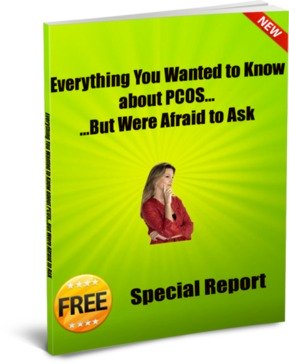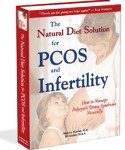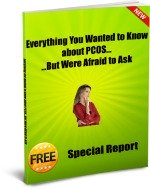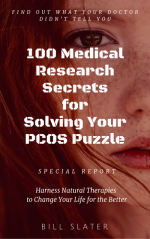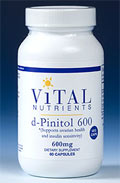PCOS Review Newsletter #157
2) Fiber for Adolescents - Boring but Essential
1) Are Cosmetics Risky?
A reader asked me: "Have you ever mentioned the disturbing amount of hormones in shampoo and many other common household items?
I was diagnosed with a "hormone imbalance" a few years ago. The doctors tried to put me on birth control, and some other pill that is a blood pressure drug that happens to block testosterone.
I refuse to take either, treating a hormone issue with more hormones is INSANE. Also, it adds to the amount of hormones in our environment (part of the problem).
I went to a holistic doctor for a bit, and did a lot of my own research. As much as possible, I've eliminated extra hormones from my diet and daily life.
I no longer douse my head in them daily! It bothers me that I had to stumble on this information on my own; the holistic doctor didn't even mention it!
This website has turned out to be a great resource: www.safecosmetics.org
I think this is an important topic that needs to be shared as much as possible. Thank you. Katie."
Thanks for sharing this, Katie. Here's what I think: women who have PCOS may be overburdened and overexposed to chemicals that mess up their hormones.
For example, some time ago I shared a medical study showing that women with PCOS had 50% more bisphenol A (BPA) than other women. BPA is a proven estrogenic "hormone disrupter" and may be associated with high levels of testosterone and insulin resistance. This chemical is common in your immediate environment.
For the most part, hair products, fragrances, lipstick, bath products, nail products, body powders and other cosmetics and personal care products contain a broad array of chemicals. Some of these products don't reveal which chemicals are in the product. So you have almost no idea of your level of exposure.
However, the research evidence indicates that chronic exposure to these chemicals can cause problems for you. I'll give three quick examples.
First, we all know that hairdressers have a lot of exposure to hair and nail care products. The Weinberg Center for Women's Health & Medicine in Baltimore, Maryland, reported that hairdressers appeared to have twice the rate of premature ovarian failure as compared to women who were non hairdressers. Premature ovarian failure is defined as the spontaneous and irreversible termination of your menstrual cycle due to ovarian failure prior to the age of 40 years.
Second, Chungbuk National University in Korea just reported that a chemical called DBP may promote the growth of ovarian cancer cells. This chemical can be found in plastics, pesticides, drugs, detergents and cosmetics.
Third, Peking University in China tested mice with a class of chemicals called "salicylate esters", which are chemicals extensively used as flavor and fragrance additives in foods, beverages and a wide variety of consumer products. They are suspected to have estrogenic activity. They found that some of these esters had an estrogenic effect higher than the maximum "safe" daily estrogen intake recommended by the U.S. Food and Drug Administration (FDA).
We can't go on pretending that environmental chemicals don't affect your ovaries and every cell in your body.
Because you have PCOS and already have an issue with hormone imbalance, it's wise to keep your exposure to environmental hormone disrupters to a minimum.
Before you apply any personal care product to your skin, hair or nails, consider whether that product may contain something that is unhelpful for PCOS and your health. Remember that the skin is capable of absorbing whatever you put on it.
So if you do use personal care products or cosmetics, keep your eye out for those that are as free of chemicals as possible.
Sources:
Gallicchio L et al, Premature ovarian failure among hairdressers. Hum Reprod. 2009 Oct;24(10):2636-41.
Park MA et al, Cell growth of BG-1 ovarian cancer cells is promoted by di-n-butyl phthalate and hexabromocyclododecane via upregulation of the cyclin D and cyclin-dependent kinase-4 genes. Mol Med Report. 2012 Mar;5(3):761-6.
Zhang Z et al, The estrogenic potential of salicylate esters and their possible risks in foods and cosmetics. Toxicol Lett. 2012 Mar 7;209(2):146-53.
2) Fiber for Adolescents - Boring but Essential
If you're a teenager who is showing symptoms of PCOS -- such as being overweight, irregular periods or skin problems such as acne or hair growing in places where it shouldn't -- here's some news that will help you.
Eat more fiber. Simple, eh?
Actually most of us don't know what fiber is. "The Natural Diet Solution for PCOS and Infertility" e-book has an extensive review of fiber. You can learn about it there.
There's lots of new research coming out to show that eating more fiber will make your problems diminish.
An example is a recent study from Michigan State University. A survey of adolescents 12-19 years old showed a strong correlation between dietary fiber intake and lowered risk of having metabolic syndrome.
Metabolic syndrome is quite similar to PCOS. So this study applies to you.
The researchers discovered that the adolescents with the lowest fiber consumption had three times the rate of metabolic syndrome compared to those consuming the most fiber. In other words, if you have a diet that is typical of any teenager, you are eating a low-fiber diet and are possibly tripling your risk of developing metabolic syndrome and its cousin, PCOS.
And that's not all. They also discovered that higher fiber intake was more effective than reducing saturated fat intake.
Fiber is super-important! OK, so where do you get it? It mostly comes from vegetables, nuts and seeds, some fruit, and whole grains and legumes.
It does not come from manufactured foods that say "high fiber" on the label. It comes from natural, WHOLE foods.
We recommend you have five servings of fresh vegetables every single day. To that you can add raw nuts and seeds, and occasional whole fruit. Beans are a good source of fiber. You can have them as a side dish or in soup or salad.
Be careful with grains. Eating "whole grain bread" is not as effective as eating whole grains themselves. Examples of whole grains are brown rice and rolled oats (NOT instant oatmeal).
If you can substantially increase your dietary fiber, good things will happen to you.
Source:
Carlson JJ et al, Dietary fiber and nutrient density are inversely associated with the metabolic syndrome in US adolescents. J Am Diet Assoc. 2011 Nov;111(11):1688-95.
PCOS Health Review
This free newsletter gives you original and immediately usable information to help you deal with PCOS.
Get the latest research, tips for improving your health, answers to questions, success stories, and more!
Your e-mail address is totally secure. We will never misuse your information.
Enter Your Email Above to Subscribe Today
and Get Your Questions Answered in this Free Special Report!
